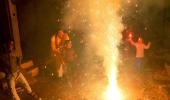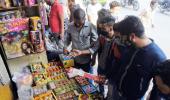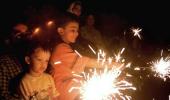The order banning firecrackers containing barium binds every state and is not just limited to Delhi-NCR region, which is reeling under severe air pollution, the Supreme Court said on Tuesday.

The clarification by the top court, which had in 2018 banned the bursting of conventional firecrackers to curb air and sound pollution, will have ramifications across the nation.
The court also sought the response of the India meteorological department on stubble burning, after it was told that farm fires in states adjoining Delhi were affecting air quality in the national capital.
A bench of Justices AS Bopanna and MM Sundresh asked the Rajasthan government to comply with its earlier directions on bursting of firecrackers during Diwali.
"Sensitising common people about the harmful effects of firecrackers is the key. Ironically, nowadays children don't burst many firecrackers but elders do. It is a wrong perception that it is the duty of the court when it comes to pollution and environment protection. People have to come forward. It is for everyone to manage air and sound pollution," the bench said.
The top court was hearing an intervention application filed in a pending petition seeking a ban on firecrackers. The application sought directions to the Rajasthan government to take steps to check air and sound pollution and impose a ban on firecrackers in Udaipur city during Diwali and weddings.
The bench, while keeping the application pending said, "...no specific orders are required to be passed in the application as the court has passed several orders to check air and sound pollutants. The said orders bind every state including Rajasthan and the state government should take note of it not only during the festive season but thereafter."
Senior advocate Manish Singhvi, appearing for the Rajasthan government, said the state has filed its reply to the application and conceded that there was marginal spike in air and sound pollution during Diwali.
The counsel for the intervenor said they are only seeking a direction to the state government that the ban imposed by this court on bursting firecrackers is not limited to Delhi-NCR but is also applicable to Rajasthan.
Singhvi said although the state will comply with all the court orders, the implementation depends on the collective conscience of the society.
He urged the court to allow bursting of firecrackers in Rajasthan for three hours between 8 pm and 11 pm instead of 8 PM to 10 pm during Diwali and other festivals.
Senior advocate Gopal Sankaranarayanan, appearing for main petitioner Arjun Gopal, said if relaxation was granted to one state, the court will be flooded with applications from other states.
The bench agreed with Sankaranarayanan's submission.
"There will be no reduction in pollution by extending the deadline by one hour or reducing it by one hour. They will burst whatever they have bought," Justice Bopanna said.
Justice Sundresh told Singhvi, "Celebrations can be done if you share what you have. If you pollute the environment, you are being selfish and self-centric. Accountability needs to be fixed on those who pollute the environment. Educating and sensitising people is more important. We are quite sure it can never be completely stopped unless people do it themselves. As is rightly said, we live on hope."
On September 22, the top court had rejected petitions filed by firecracker manufacturers seeking permission for manufacture and sale of firecrackers containing barium and joined fireworks (series crackers or laris) as per new standards.
It reiterated its 2018 ban and directions on bursting conventional firecrackers to curb pollution.
On September 14, while dealing with a plea seeking a ban on firecrackers containing barium to curb pollution, including in Delhi-NCR, the top court had asked the city police not to issue temporary licences for sale and storage of any kind of firecrackers, saying when the Delhi government has banned all firecrackers, no distinction can be made on the basis of whether those are green or not.
The top court had on October 23, 2018 directed that people across the country can burst firecrackers from 8 pm to 10 pm only on Diwali and other festivals and allowed manufacture and sale of just "green crackers" which have low emission of light, sound and harmful chemicals.
It had carved out an exception for Christmas and the New Year eve saying firecrackers for these occasions will be burst between 11:55 pm and 12:30 am, since these celebrations start at midnight.
It also banned the manufacture, sale and use of joined firecrackers, saying they cause "huge air, noise and solid waste problems".
The apex court had said the noise and smoke emission limits will have to be approved by the Petroleum and Explosive Safety Organisation.










 © 2025
© 2025